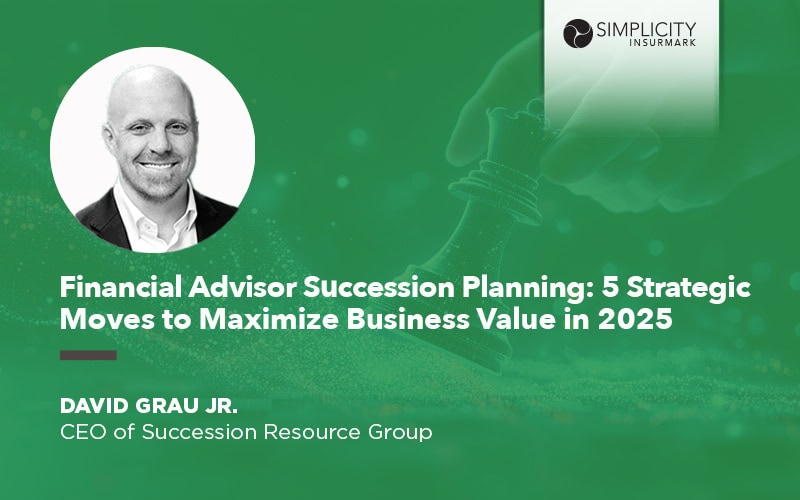If you’re a financial advisor nearing retirement, you’re not alone. The financial services industry is aging fast, and succession planning has never been more critical. With mergers and acquisitions on the rise and valuations shifting rapidly, now is the time to take action. In this guide, we’ll break down five proven strategies to help financial advisors build a business that’s not only sale-ready—but highly valuable.
Key Insights for Advisors:
- M&A activity in the financial advisory space continues to accelerate.
- A strong “growth engine” is the #1 driver of successful succession plans.
- Businesses with scalable processes and clear financials command higher valuations.
- Buyers prefer turnkey businesses, not just books of business.
- Treat your practice like a high-value asset—because that’s exactly what it is.
Mergers & Acquisitions are surging in the financial advisory industry
The market for advisory firm acquisitions is heating up. As more advisors near retirement age, deal volume is hitting record levels. According to David Grau Jr., CEO of Succession Resource Group, this trend is largely driven by “RIPs” (Retired in Place advisors)—seasoned professionals who still serve clients well but are no longer focused on growth.
“That has been a consistent trend we’ve seen for the better part of the last six or seven years. There are a lot of RIPs in the industry who are not in growth mode anymore,” said Grau on a recent episode of The Breakthrough Advisor podcast.
This creates prime opportunities for younger advisors or aggregators to step in—but the practice must be positioned correctly.
Growth mindset = higher valuation for your advisory business
Buyers today prefer to buy businesses that can run smoothly and profitably once the founder exits. That means advisors need to think beyond client relationships and focus on business scalability. If you’ve slowed down prospecting or marketing efforts, your valuation could take a hit.
✅ Pro tip: Keep investing in business development—even if you’re planning to exit. Buyers pay premiums for growth-ready firms with systems in place.
Five succession planning strategies financial advisors should consider
To maximize the value of your practice and ensure a smooth transition, here are five succession planning strategies to consider implementing:
Strategy #1: Focus on growing instead of going
Grau emphasizes a counterintuitive but powerful idea: succession planning should be more about growing—not going.
“And it’s very doable. If we’re mentoring and training the next generation or bringing them in from the outside, maybe through a merger, it’s fine to cut back and maybe just do rainmaking,” Grau says.
Whether through mentoring the next generation or merging with a growth-minded firm, the key is to maintain momentum.
Strategy #2: Build a scalable growth engine
According to Simplicity InsurMark’s Jack Martin, 90% of advisor succession plans fail and the main reason they do is because there’s no growth engine in place. That’s a costly oversight “because whatever multiple they could get last year are probably a little bit less this year, and a little bit less the next year,” Martin says.
A well-built marketing growth engine helps:
- Attract new leads automatically.
- Nurture prospects with consistent outreach.
- Track and measure growth performance.
- Ensure processes are on point and followed consistently.
Best of all, today’s fintech makes automation affordable and accessible for practices of any size.
Strategy #3: Know your numbers (and watch them like a CEO)
Valuation is data-driven. Review your profit and loss statements regularly, track KPIs and understand what your business is worth—at least on paper. Grau recommends estimating firm value annually based on published multiples because keeping financials top of mind makes it much easier to focus on managing them.
🔍 “What’s measured improves.”
Strategy #4: Build a team of internal specialists to help run the business
As a practice grows, it makes financial sense to hire staff to handle specific tasks. That way, the advisor can focus on business growth, and in collaboration with the next generation, create a business that can grow independent of its founder.
“What we see folks have success with is not trying to recruit to solve their succession woes. Instead, plan for internal succession. Hire two or three, keep one or two—and you’ve got a solid batting average,” says Grau.
Internal hires who act as ‘farmers’ do a great job maintaining client relationships and are more likely to stick around. This frees up the advisor to continue rainmaking, which can make the business more attractive to buyers.
Strategy #5: Treat your practice like a classic sportscar
Maintenance matters. Whether you plan to sell to an aggregator or pass the firm to a junior partner, keeping your business “tuned up” pays dividends.
“They’d rather buy a well-maintained business than a fixer-upper—every day of the week,” says Grau
FAQs about advisor succession planning
What is the average age of financial advisors in 2025?
As of 2025, the average age of a financial advisor in the U.S. is approximately 58 years old, up from 56 in 2023 (J.D. Power).
What types of succession plans are available for financial advisors?
Advisors typically choose from these succession planning options:
- Internal succession: Passing the business to someone within the firm
- Family succession: Transitioning ownership to a family member
- External sale or merger: Selling to another advisory firm or aggregator
Each path has pros and cons depending on the size, structure and goals of your firm.
How many financial advisors have a succession plan?
According to SmartAsset, around 64% of advisors had succession plans as of early 2022. That leaves a significant number unprepared.
Simplify your succession strategy with Simplicity InsurMark
At Simplicity InsurMark, we help growth-focused advisors streamline their operations, attract new clients and maximize their business valuations. Whether you’re just starting to think about retirement or you’re actively preparing to sell, we’ll help you build a plan that aligns with your goals.
💡 Want to learn more? Schedule a discovery call to explore our Value Engineering Process and tools to maximize growth.
🎧 And don’t forget to check out the full episode of The Breakthrough Advisor podcast with David Grau Jr. and Jack Martin for more expert advisor succession planning insights
About Simplicity InsurMark
As an Advisor Development Organization™ (ADO), Simplicity InsurMark empowers financial professionals with cutting-edge tools, marketing resources, and mentorship opportunities. Our mission is to protect and enhance the financial security of every home in America—starting with yours.



